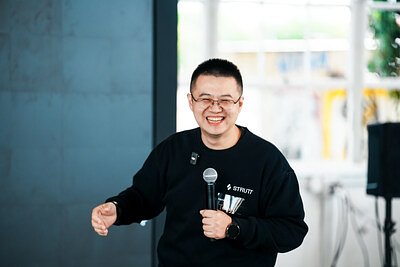
Strutt's ev¹: Redefining Personal Mobility with AI and Human-Centered Design
Singapore-based Strutt Inc. is challenging the personal mobility market with its ev¹—a smart vehicle integrating advanced sensing, autonomous tech, and a focus on user dignity. Awarded top honors at Red Dot and CES.
Strutt's ev¹: Redefining Personal Mobility with AI and Human-Centered Design
NEW YORK, NY – November 14, 2025
A New Approach to Personal Mobility
Singapore-based Strutt Inc. is poised to disrupt the personal mobility market with its innovative ev¹ smart vehicle. Unveiled at a pre-launch event showcasing hands-on demos, the ev¹ isn't just another powered wheelchair or scooter; it’s a rethinking of how people navigate their world, prioritizing independence, safety, and a sense of dignity. Backed by Matter Venture Partners and Vertex Ventures, Strutt is positioning itself as a leader in a growing market increasingly focused on human-centered design and intelligent technology.
The personal mobility device market is projected to reach over $21 billion by 2033, driven by an aging global population and a growing desire for independent living solutions. While established players dominate the sector, Strutt aims to carve out a niche by integrating automotive-grade technology—typically found in self-driving cars—into a personal mobility device. This approach, combined with a focus on user experience, has already garnered significant industry recognition, including a 2025 Red Dot: Luminary award and a 2026 CES Best of Innovation accolade.
Technology at the Core: evSense and Quad-Drive
The ev¹’s differentiating features center around two core technologies: evSense and Quad-Drive. evSense is a sophisticated 360° sensing system that utilizes LiDAR, cameras, ultrasonic, and Time-of-Flight sensors to create a detailed understanding of the surrounding environment. This allows the ev¹ to proactively avoid obstacles, navigate complex spaces, and provide a safer, more confident experience for the user. "The goal wasn't just to build a vehicle that could navigate, but one that anticipated potential hazards and reacted accordingly," explains a source familiar with the project. The “Co-Pilot” feature is a particularly notable component of evSense, assisting users with navigating tight indoor spaces and crowded environments.
Complementing evSense is the Quad-Drive system, a four-wheel active drive architecture designed for both indoor and outdoor maneuverability. Unlike traditional powered wheelchairs that rely on two-wheel drive, the Quad-Drive provides precise control and enhanced stability, particularly on uneven terrain or inclines. The system’s “Smart-Wheel” technology allows for independent control of each wheel, providing a smooth and responsive experience. “We wanted to create a vehicle that felt natural and intuitive to operate, regardless of the environment,” shares another source involved in the development process.
Beyond Functionality: A Focus on User Dignity
While technological innovation is at the heart of the ev¹, Strutt is equally focused on addressing the often-overlooked emotional and psychological needs of individuals requiring personal mobility assistance. Traditional mobility devices are often perceived as clinical or stigmatizing, hindering a user's sense of independence and self-worth. Strutt's design philosophy, “Quiet Empowerment,” aims to overcome these perceptions by creating a vehicle that seamlessly integrates into a user’s lifestyle, enhancing their confidence and freedom.
This focus is reflected in the ev¹’s sleek, modern aesthetic and user-friendly interface. Extensive user research informed the design process, ensuring that features like adjustable armrests and intuitive joystick controls prioritize comfort and ease of use. “We spent a lot of time talking to people who rely on mobility devices, understanding their frustrations and unmet needs,” explains a member of the design team. The company conducted workshops with potential users, including Paralympian athletes, receiving positive feedback on comfort and usability. The emphasis on design extends beyond aesthetics, with a focus on creating a device that feels empowering rather than assistive. The high-capacity LFP battery utilized in the ev¹ further underlines this commitment to safety and longevity, providing reliable performance and peace of mind.
Navigating a Competitive Landscape
The personal mobility market is becoming increasingly crowded, with established players like Segway, Whill, and Permobil vying for market share. These companies offer a range of powered wheelchairs and scooters, often incorporating smart features and advanced technologies. However, Strutt believes its unique combination of automotive-grade technology, human-centered design, and a focus on user dignity will differentiate it from the competition.
Strutt is also establishing production operations at JTC’s Bulim Square facility in Singapore, aiming to produce 1,000 units per month when fully operational. The company's backing from prominent venture capital firms provides a solid financial foundation for scaling production and expanding into new markets. While the market is competitive, Strutt’s early accolades and focus on innovation position it as a compelling alternative for consumers seeking a more sophisticated and empowering personal mobility solution. The company is actively developing partnerships with healthcare providers and rehabilitation centers to integrate the ev¹ into existing care pathways.
